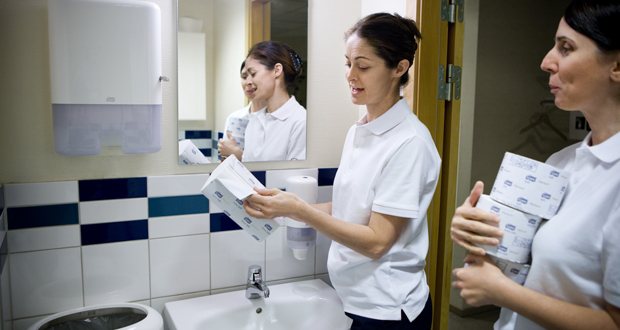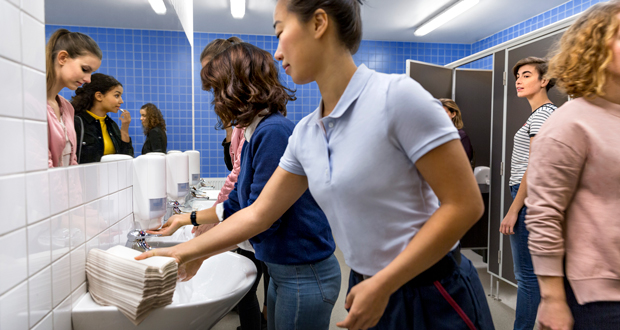Toilets at music festivals are notorious for being crowded, messy and unsanitary facilities. Stuart Hands, Sales Manager of Tork manufacturer Essity, considers how the festival washroom could be improved.
Open-air music festivals are the ultimate celebration of summer. There is nothing more uplifting than listening to one’s favourite bands in the sunshine alongside fellow music-lovers.
But an unpleasant trip to the toilet could colour the whole experience. A lengthy queue to visit a dirty, unsanitary facility could dampen anyone’s spirits – particularly when the whole experience will have to be repeated regularly throughout the event.
A shortage of toilets – particularly those with disabled access – were among the problems that caused outrage among people attending the Northern Kin Festival in County Durham in May this year. And some people who attended last summer’s Beautiful Days festival in Devon said the toilets were so unacceptable that they would think twice about coming back.
People have been complaining about festival toilets for years. A survey commissioned by Tork and carried out by IPSOS in 2009 revealed that poor washrooms ranked higher on people’s lists of festival negatives than crowd disorder or poor food and drink options.
In a second study of 1,000 respondents it emerged that 44 per cent of visitors avoided using the washrooms altogether when attending an open-air event. And 20 per cent deliberately refrained from drinking to avoid having to use the loo. Besides potentially leading to dehydration in hot weather, a drink veto would have a disastrous impact on the bar profits of any festival venue.
Some stadiums now offer “luxury loos” to make the experience more bearable for people willing to pay. These facilities are provided by third-party companies: for example, When Nature Calls offers flushing WCs and warm water taps for around £30 per day, while Refresh Retreat charges approximately £40 for its own enhanced washrooms, free toiletries and access to hair care stations.
But most festival goers will be reluctant to pay this premium on top of the cost of their ticket. So, what are the main issues associated with the festival washroom, and how can these be addressed?
The problem lies in the sheer volume of people who all want to use the washrooms at once – either before or after the event or between acts.
These peaks in traffic lead to maintenance issues for cleaners while also putting pressure on supplies of toilet paper, hand towels and soaps. And when consumables run out, people will be forced to wait in line for those cubicles and sinks where supplies are still in place.
Hand drying is generally a sticking point because it often leads to queues – particularly where air dryers are installed because these take at least 10 seconds to dry the hands. Some stadiums opt instead for supplying loose hand towels and leaving them on the units for visitors’ use. But these create a messy environment since visitors will pick up one or two in a hurry and perhaps drop others on the floor in their impatience to return to their seat.
As queues start to form, frustration will mount – and angry people are likely to show less respect for their surroundings which means vandalism might occur.
After a lengthy wait to use the loo, some visitors might be tempted to carry out a cursory hand wash so that they can hurry back to their seats. This will result in poor hygiene outcomes while people might also leave behind messy sinks, running taps and discarded hand towels in their haste to leave the facilities.
So the entire washroom experience will have been marred by queues, mess, unruly behaviour and run-outs of paper and soap. And this will result in dissatisfied customers who may choose to shun that particular festival venue in future.
How do managers turn this picture around and equip their washrooms to reduce queues, minimise run-outs and improve the customer experience?
High-capacity washroom units that naturally reduce consumption will minimise the risk of dispensers running out between maintenance checks. All units should be quick to refill and easy to use to prevent the formation of queues and logjams. And the dispensers should be designed to reduce the likelihood of waste and mess.
Soap bars and bulk-fill soaps often result in sticky soap residues left behind on the basins while C-fold towels – which tend to come out of the dispenser in clumps – will lead to soggy discarded towels on the units and floors. And conventional toilet rolls are all too easy to throw around, leave on the floor to become soggy or drop down the toilet. These scenarios will lead to blockages, waste and mess.
Venues should opt instead for soap supplied in sealed cartridges which will prevent the issue of messy sinks. And toilet paper and hand towels should be supplied in robust, lockable dispensers that give out only one sheet of paper at a time. This will help to control consumption and limit mess while the sturdy units will help prevent vandalism.
There are other ways in which stadium washrooms can be improved. Well-thought out facilities with a sufficient number of cubicles and urinals, a good design and plenty of space to queue will help to relieve the pressure. All dispensers should be carefully positioned to allow a quick throughput of visitors: for example, soap dispensers should be situated above the sinks while hand drying units should not protrude so far that they impede traffic in and out of the washrooms.
A festival experience should be memorable – for all the right reasons. And a few simple changes in the festival washroom could help to prevent a terrible toilet visit from spoiling the whole event.

• Essity offers a range of Tork washroom systems designed to speed up washroom use and control consumption in festival washrooms. The Tork PeakServe® Continuous® Hand Towel holds enough towels for up to 1,400 hand dries and the Tork SmartOne® Twin Mini Toilet Roll System comes in a lockable dispenser that delivers one sheet of paper at a time. This helps to prevent runouts, vandalism.
For more information, go to www.tork.co.uk




